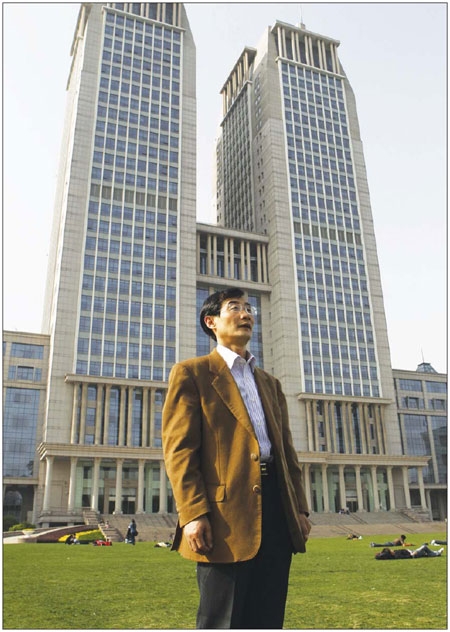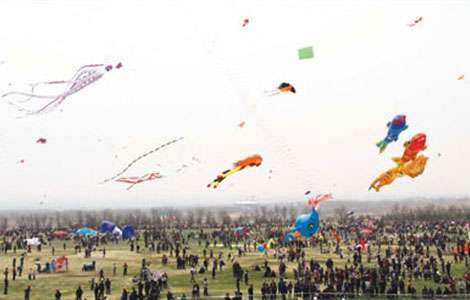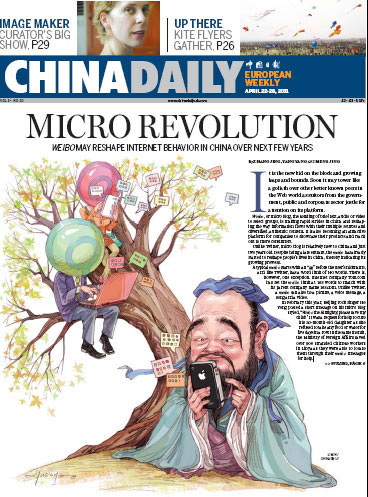Shaping the world
Updated: 2011-04-29 10:47
By Matt Hodges (China Daily European Weekly)
|
 Ding Chun, director of the Center for European Studies at Fudan University. Yong Kai / for China Daily |
Europe Centers help in gauging public, political opinion
Much like political think tanks, China's university-affiliated Europe centers help to shape public and political opinions in China. They can also take ideas generated by the Chinese government, academia and public to Europe, according to Ding Chun, director of the Center for European Studies at Shanghai's prestigious Fudan University. "I think we have some influence on both sides, for example, we have a close relationship with the European scholars and organizations, and very good government connections in China,?he says.
"As you can see, I have a lot of photos." Besides the obligatory picture in China of the subject standing atop a snow-capped mountain surveying all before him, Ding has rows of photos of himself arm in arm with European political heavyweights such as former German chancellor Gerhard Schroeder.
In response to fears of the country's care of a graying population, the center organized a forum on long-term care for the elderly last year. It invited European scholars and welfare officials, and surveyed and interviewed elderly people in Shanghai.
"The government, and the Shanghai Bureau of Civil Affairs, learned a lot from all this input, because we still don't have a compulsory long-term care insurance here," says Ding, who is also secretary general of the Chinese Society for EU studies.
China has set 2020 as its deadline for providing social security to the entire population. Having modeled its pension system as a rough composite of the systems employed in Germany and Singapore, the country has developed a habit of looking overseas for inspiration.
"We used to just emulate European models of social welfare, but now, as academics, we need to look for the weaknesses in these models and see what works best for China," he says.
Due to the center's top priority as an academic organization, it can also appeal to the public from the perspective of academic rationality and objectivity.
"When Sino-French relations hit a rough patch before the Beijing Olympics, during which time interruptions took place in the torch relay in Paris, and President Nicolas Sarkozy met the Dalai Lama, Chinese people became very excited," he says.
"But when things intensified to the point of boycotting Carrefour, we made a point of highlighting the background of the situation, to help calm down the public overreaction and promote mutual understandings between the two sides."
Ding says the centers are in essence multipurpose.
"We help shape public opinion in China and act as consultants to government figures and authorities, as well as letting Europeans know more about the reality of China. For example, most Europeans aren't aware of the chronic regional disparity in wealth we have. They don't know there is a world of difference between the skyline of Pudong, in Shanghai, and the situation in western China."
As an expert in matters pertaining to Chinese economics, Ding is often invited by foreign media to comment on geopolitical affairs. When the financial crunch hit in 2008, he was based in Germany and was asked to provide a commentary for Die Zeit, Germany's most widely read newspaper.
He advised the German government to respond immediately to rescue financial institutions attacked by the US subprime loan crisis, focus more on trading with emerging economies, and develop its green economy, among other measures.
"I'm happy to look back now and see that most of my suggestions proved correct," Ding says. He claims there is a growing freedom in China to hold discussions concerning official thoughts and government policies.
"The real key now will be whether the government can emulate its success over the next 30 years. It will need to be very careful.
"Fortunately we still have a low rate of urbanization (of 48 percent, compared to a global average of 65-70 percent, or even higher in Europe), and this transitional process will continue to feed the economy."
The center opened its doors in 1993, making it the oldest of the 16 or 17 such centers in China, with the aim of researching and teaching students about the economics, politics, legal framework and social aspects of the European Union and EU integration.
From 1997-2001, the EU China Higher Education Program, run by the European Commission and China's Ministry of Education, helped bump start efforts by promoting exchanges of scholars and joint research. Meanwhile, European studies in China got another shot in the arm from 2005-08 courtesy of the European Studies Center Program (ESCP), which was led by the EU and China's Ministry of Commerce.
Nowadays the center's role has grown, with Ding chairing a Dutch Study Center and editing annual Chinese reports on the EU economy. However he still regularly invites European policymakers to deliver speeches and attend forums, while using whatever opportunities comes his way to discuss issues of common concern.
During last year's Shanghai World Expo, he jointly ran a debate about green economies and governments' roles in tackling pollution among local students at the Belgian-EU Pavilion.
Since it launched its Ambassador Forum in 2005, the center has already welcomed over 40 opinion shapers, including Schroeder. Herta Daeubler-Gmelin, Europe's former head of human rights dialogue, visits the school nearly twice a year.
According to Ding, China's Europe centers will continue to pop up in response to growing grassroots interest among students in European affairs and more Sino-European dialogue and trade. The majority of students at Fudan are encouraged to spend at least one semester in Europe - a far cry from the situation 20 years ago, when getting a passport was next to impossible for most Chinese.
"One of our main jobs is analyzing Sino-EU relations for future elites. As such, we need more information about Europe at both a macro and micro level," says Ding, adding that interest in Europe among the student body is mushrooming, and vice-versa.
"Before Europeans just came to study the language. Now many come to study subjects like financial management and political science," he says.
Nonetheless, Ding sees bumps in the road ahead for the two allies, despite there being no strategic conflicts comparable to those that influence Sino-US ties.
"European companies used to enjoy very privileged tax conditions, but now we are hearing lots of complaints about the taxation system here, or about labor costs, because we are implementing labor contract laws," he says.
"Now the situation has equalized and they are in the same boat as local companies. They may not like it, but this kind of thing is normal as trade and ties grow."
E-paper

Blowing in the wind
High-Flyers from around the world recently traveled to home of the kite for a very special event.
Preview of the coming issue
Image maker
Changing fortunes
Specials

British Royal Wedding
Britain's Prince William and his girlfriend Kate Middleton get married on April 29.

Costly dream
Uninhabited havens up for lease but potential customers face wave of challenges in developing them.

Models gear up car sales
Beauty helps steer buyers as market accelerates.
